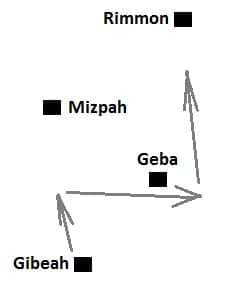GOD’S WORD FOR YOU
JUDGES 20:36b-48
The men of Israel had retreated before Benjamin, because they trusted the ambush they had set against Gibeah. 37 The men waiting in ambush rushed quickly against Gibeah. They spread out and put the whole city to the sword. 38 The prearranged signal between the men of Israel and the men waiting in ambush was this: when they made a great cloud of smoke rise from the city, 39 the men of Israel should resume the battle. So when Benjamin had begun to strike them down, killing about thirty men of Israel, they said, “They’ve been defeated before us, just as they were in the first battle.” 40 But when the column of smoke began to go up from the city, the men of Benjamin looked behind them, and the whole city was going up in smoke rising into the sky. 41 Then the men of Israel attacked again, and the men of Benjamin were terrified when they realized that disaster was upon them. 42 They turned their backs to the men of Israel and ran toward the wilderness, but the battle overtook them, and those who came out of the cities slaughtered them.
As the men of Benjamin came out for the third time, the battle began as it had before. They advanced north toward Mizpah to meet the Israelites there. Mizpah is the highest hill in the area (there is an excellent view of Jerusalem from its crest). Tristram’s “Topography of the Holy Land” (1871) has this to say: “It rises abruptly from the table land, with terraced and well-cultivated sides, to a height of 500 or 600 feet. No other peak in southern Palestine affords such a panorama… it was therefore well-named Mizpah, ‘the watch tower’” (p. 111).
Seeing their city burning behind them, the men of Benjamin turned (verse 42), the first of three turns in this battle. They turned east, toward the village of Geba. Some textual issues make Geba (Hebrew gb‘) appear to be spelled like Gibeah (gb‘h), but in any case, Benjamin turned to the right (east).
43 They surrounded the Benjamites, pursued them, and easily overtook them near Geba toward the east. 44 There were eighteen thousand men who died from Benjamin, all elite soldiers. 45 Then Benjamin turned and fled toward the desert to the rock of Rimmon, but Israel killed five thousand men on the roads. They overtook them at Gidom and struck down two thousand more.
Surrounded, the men of Benjamin turned a second time. Now they ran north, toward a place called the rock of Rimmon. No mere stone, Rimmon is an impressive stony cliff several hundred feet above the valley where houses cling to outcroppings and give access to various crags and caves. A handful of men might resist the onslaught of hundreds of attackers with little trouble as long as loose stones are within reach. However, thousands fell on the road to Rimmon as the ambush closed around them. We don’t know where Gidom was, but it seems clear that it was somewhere between Geba east of Gibeah and Rimmon to the northeast. The points of Mizpah (northwest), Gibeah (southwest), Geba (east) and Rimmon (northeast) form a kind of flattened cardboard box standing on end. The dash of the Benjamites follows the path, if you can imagine it, from the handle up the outer right-hand tine of a fork.
46 All the Benjamites who died that day were twenty-five thousand elite soldiers armed with swords. 47 But six hundred men fled into the desert to the rock of Rimmon and stayed there four months. 48 The men of Israel turned back to Benjamin and killed them with the sword , all the towns, the animals, and everything that remained. They burned every town that was left.
After the fighting force of 25,00 men of Benjamin fell (20:35 gives a more exact number of 25,100), the Israelites turned and attacked the remainder of the tribe. They “killed them with the sword,” and although the euphemistic word “towns” is employed, we must understand that the Israelite soldiers put the whole tribe to death: old men, women, and children. Even their animals were killed; nothing remained. All of the towns were burned. Everything disappeared. In a single day, Benjamin went from a strong tribe with an effective army to a smoking ruin.
At this point, many readers may wonder: How could this be? Were thousands of Benjamites hidden away somewhere, late, perhaps, to escape from Egypt, or off in exile someplace? The answer is no. The men, women, children and animals of Benjamin all died on this day except for a single fighting brigade that made it to Rimmon (verse 47) and about whom we will learn in the final chapter of the book. But a careful reader of Judges will already know that someone survived. This event happened early in the days of the judges, about the time that Othniel was shepherding the people. But the very next judge after Othniel was Ehud, a men from Benjamin (even left handed). Either he or his father Gera were part of the small group of survivors. What we will learn in chapter 21 is how a handful of soldiers with no wives or children could become a whole tribe once again—but they did, by the mercy of God.
In Christ,
Pastor Timothy Smith
Archives by Wisconsin Lutheran Chapel: http://www.wlchapel.org/worship/daily-devotion/
Pastor Smith serves St. Paul’s Lutheran Church, New Ulm, Minnesota
